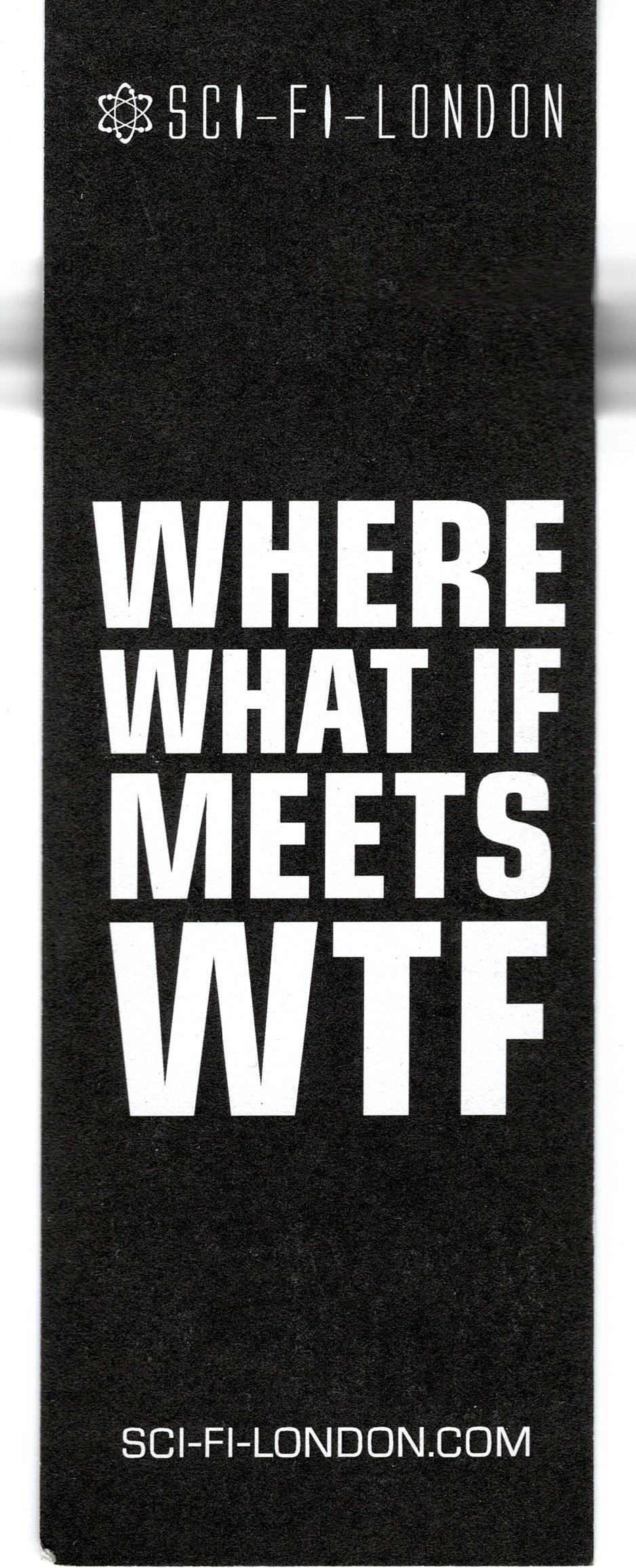Convention Review
Sci-Fi London Film Fest 2025
The 23rd physical incarnation of the London film fest
In person 14th September 2025 at the Picturehouse,
Finsbury Park, London and virtually online 19th – 22nd June 2025.
Jonathan Cowie reports.
Sci-Fi London began in the iconic year of 2001 and so, by rights, this year's iteration should be the 25th iteration of this film fest but, remember, we had two CoVID lockdown years and so this was the 23rd (or perhaps the 24th if you count the lockdown year in which the event was held virtually online). Regulars may recall that last year there was a problem in that the regular venue fell foul of the Cineworld closure programme and that that, combined with the Fest's leading light's personal circumstances, meant that last year's Sci-Fi London was reocated at short notice to the Fest's past ancillary venue, later than usual and it was just one day long and not three. This year, the Fest was at a new venue, the Picturehouse, Finsbury Park. Finsbury Park is just a few miles north of central London's West End (London's political and entertainment quarter – it's where the King hangs out) and on both a main-line rail route as well as an underground line. And the really good news is that the Picturehouse venue is just a couple of buildings away from the station's western exit. And it faces on to a pedestrianised street with cafes, restaurants and a supermarket nearby/opposite: these provided fest-goers with ample resources for their stay.
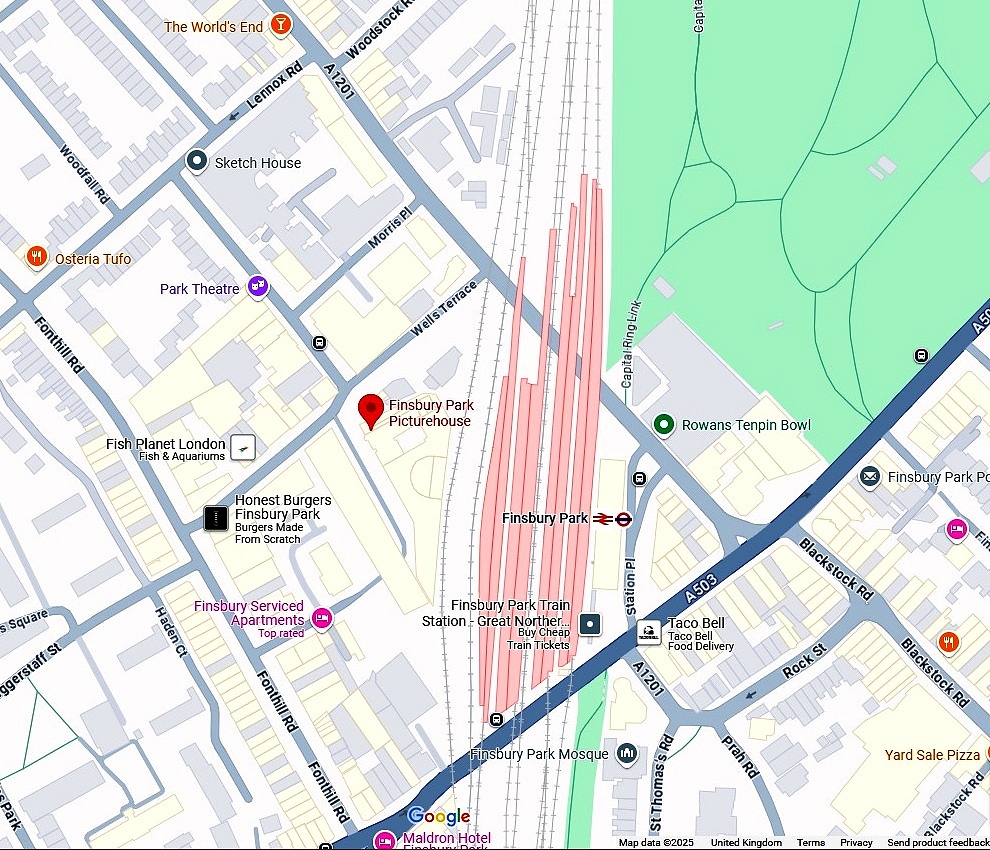
The venue itself was a bit of a maze, but functional once you got orientated. There was a bar and café area downstairs and another bar upstairs that had less a range of stock and only took electronic/card payments: a not insignificant minority of cash-only users were caught out by this and so the first day the downstairs bar got a brisk trade, after which everyone knew to bring a digital method of payment.
The upstairs bar area also served as a sort of base of operations, cum green room, throughout the film fest. The theatres themselves were a tad on the small size and so seemed fairly full for most screenings. They were largely functional, but having their aisles on just one side of the theatre was a bit of a pain especially if an attendee had to leave before the film's end (due to having to commute), or take a comfort break, could see them having to squeeze past a lengthy row to get out. These minor issues aside, this was a perfectly practical venue.
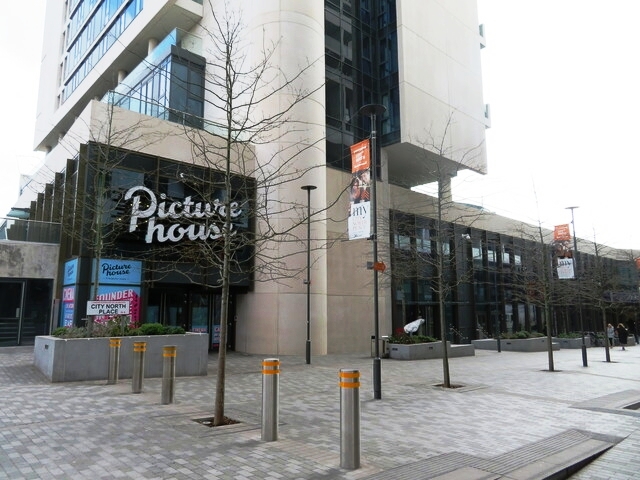
The Picturehouse with surrounding pedestrian area,
well-served with shops caf&eacurte;s etc.
The one thing that was to mildly colour the Sci-Fi London week – which was beyond the control of the Fest's organisers – was the weather, specifically, London's second heatwave of the year that took temperatures most days to well over 30°C! Fortunately, the Picturehouse had good air-conditioning but this meant that some clothing was needed to take of the indoor's chill, but which was too much in the sweltering outside. Given that most of the attendees were commuting in to the event each day this was an issue, as was the heatwave's impact on travel. For example, one day saw a trackside fire which impacted morning trains to and from central London, and another day saw rail lines buckle so causing severe delays with reduced rail lines to use: fortunately, Finsbury Park has seven British Rail tracks passing through the rail part of the station but even so there were cancellations and delays all amid the boiling, day-time heat.
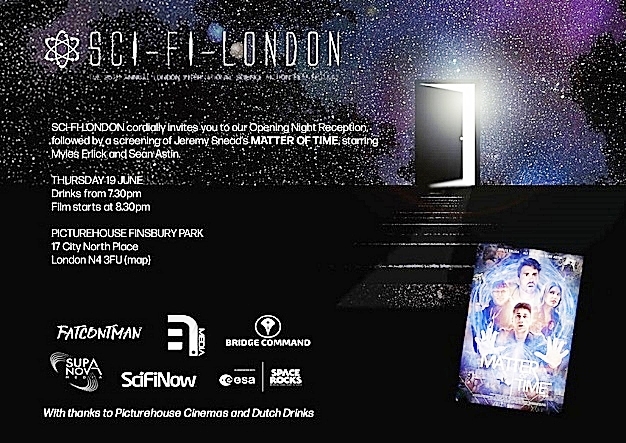
In addition to the functional parts of the venue – theatres, green room, etc – the downstairs foyer are and part of the green room cum base of operations – there were prints and original SF artwork by John R. Mullaney in a number of genre franchises such as Alien. Plus there were various fliers and handouts including from the likes of the European Space Agency's science-arts outreach programme, 'Space Rocks'. All good stuff.
|
|
The programme was effectively divided into two streams in two of the Picturehouse's neighbouring theatres, though fortunately for a good proportion of the time there was only one stream which meant that at those times one did not have to miss out on the rather good and recent offerings on the other programme track. Offerings were largely, if not invariably, from independent studios and most from overseas with a good number of British premieres in the mix. This is material you are unlikely to see anytime soon on British television or the major streaming platforms, and – from my experience of past Sci-Fi London's and other genre film fests – sometimes these films never make it to such media, so if you do not catch them at the Fest you have to seek out the DVD. All of which makes the programme a little special. Add to which, film fests, with their focus on screenings, are mercifully free of the recent trend in British Eastercons and Worldcons internationally that have today become extremely dominated by fan panels that are very much a curate's egg: they are hit and miss affairs of varying quality and – once everyone has introduced themselves and said why they are there – of limited time. In short, the Sci-Fi London programmes of screenings and director interviews and Q&As are a considerably more quality affair.
The films ranged from comedy, horror, action, and a golden oldie in the mix for kids, etc., so there was pretty much something for everyone into cinematic SF.
The programme itself could broadly be divided into three categories: feature films; shorts; and additional extras. Let's look at each in turn…
The films. As said, there was a good mix of type of films and a good number of British premieres in the mix, with many overseas makers. The fest's opening feature was one such. Matter of Time was the Fest's first cinematic offering and screened late the first night following a reception for the Fest's creators, stakeholders and sponsors.
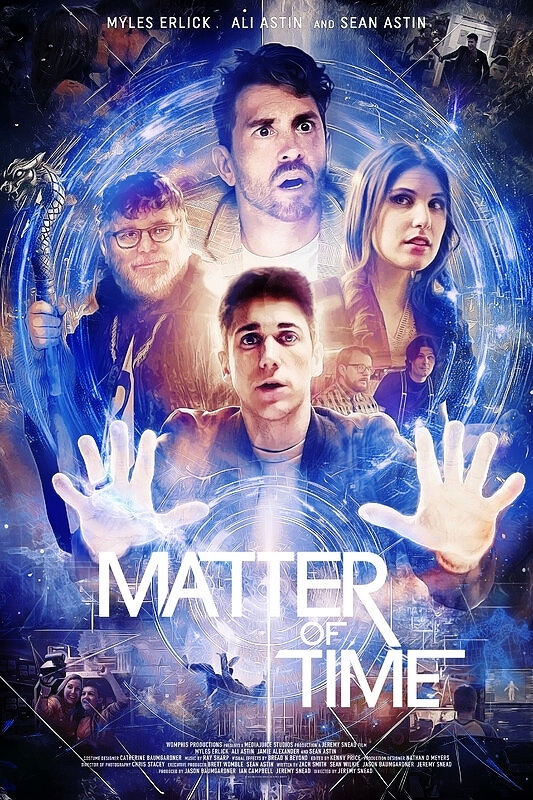
Matter of Time was an offering from across the Black Atlantic and the USA. Directed by Jeremy Snead. It was a polished offering, a science fantasy but this last had a solid SFnal rationale… (I do like that.) What if you could hit pause on life itself? Charlie (Myles Erlick), a 29-year-old aspiring video game designer who is going freelance, sees his world change when his friend Gibbs (Sean Astin, a toy shop owner) hands him a mysterious device that can stop time. Suddenly, Charlie’s world becomes a playground where seconds freeze and possibilities multiply. He could work doubly hard in half the time to meet the onerous deadlines his hirers impose. But messing with time isn’t just a trick. As Charlie dives deeper into this strange power, he’s forced to confront the ethical dilemmas, and the laws of space-time, with personal consequences, that come with bending reality. Caught between ambition, regret, and temptation, he must decide whether controlling time means controlling his fate or losing it altogether…
This was a polished production, slickly and colourfully shot, with sound scripting. This is one I will definitely look out for on the television channels especially as I missed the last half hour due to late night train times.
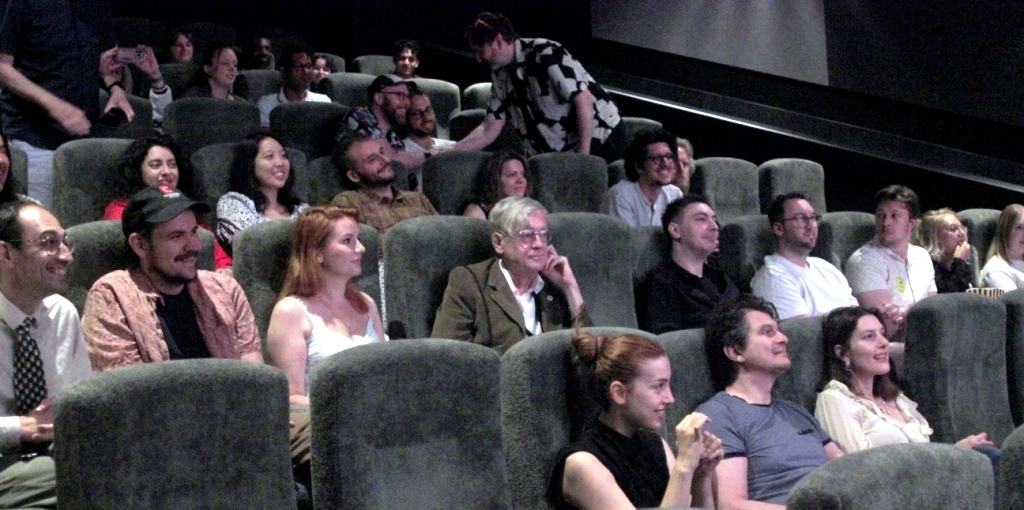
Part of one of the Sci-Fi London programme stream's audience.
The Strange Dark was another US offering and another UK premiere (you do get value for money when it comes to premieres at Sci-Fi London). The future is a mystery; it is 'the strange dark'.. said Albert Einstein!
Strangers appear at the front door of a family home who say they are from 'Double Accounting', and it slowly becomes clear that something very odd is going on. It is not that long before Edgar (the husband/father) thinks he can see the future, his wife thinks he has lost the plot, and his daughter does not know what to believe.
This low-budget production was high on invention and was a little special as it is the director, Chris Messino's, feature debut. Slow burn, as the fest's programme book puts it, 'just the right side of unhinged'.
Schirkoa: In lies we trust was a surreal (and absurdist) dystopic, 3D animation set in a near future world where everyone wears a paper bag over their head – literally. In a city of conformity and control, one disillusioned government employee accidentally stumbles across a secretive, rebel movement. With seductive animation, we follow our hapless protagonist on a hypnotic journey through dreamlike cityscapes and corporate nightmares. This cyber-noir blended politics and philosophy with a look at what one could imagine is not too far – though not reality (the paper bag over the head is allegorical), in principle at least – to somewhere where or real world might be heading…
This Franco-Indian film was made in English and, as the fest's programme says, this was an 'English' premiere, which I guess means that it had a showing previously elsewhere in the UK be it: Scotland, Wales or Northern Ireland. This comes from Ishan Shukla, who some may know was the director of Star Wars Visions: Vol. 2 – The Bandits of Golak.
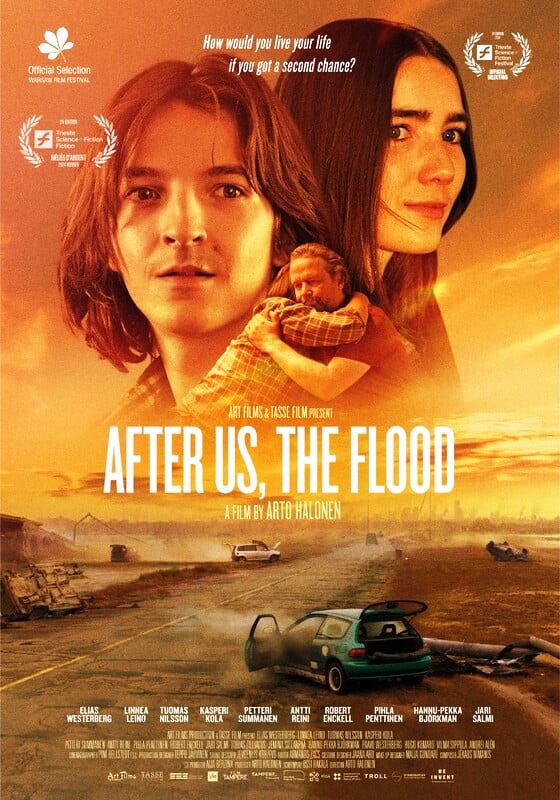
After Us, The Flood was the film of the fest which, on my pre-event, initial posting of the programme on their website, I was most looking forward to seeing… I was, however, disappointed – purely down to my own mis-anticipation – and then again rewarded with a neat, dark humour, time travel tale from a dystopic climate future to our present in an attempt to avert climate chaos…
Now, film viewing (book reading, whatever) is a personal experience and I came to this one given my interest in climate change…
By 2064 the world has warmed, the climate has change, the population has grown, resources are depleted and human civilisation is on the brink. However, decades earlier, Henrik, a brilliant physicist, and his small team develop a remarkable, small fusion reactor that produces cheap, low fossil-carbon energy. The problem is that Henrik sold the rights to a private company to finance his research as well as personal wealth. It was the company, charging for its energy over many years at exorbitant rates compared to what was needed to avert climate disaster, that has resulted in humanity's global society facing imminent collapse. However, in a final bid to save humanity, the United Nations decides to deploy an untested form of time travel in which a person's consciousness is transported back in time to earlier in their lifetime. Henrik and one of his close colleagues are sent back in time to their births with a mission to meet up years later and recreate their fusion reactor but instead to give it freely to the world… That's the mission, what could possibly go wrong, especially as the stakes were so high?
OK, I said I misled myself with this one when reading the early fest publicity. I had thought this would be some allegory on how vested interests are hijacking the climate debate, or our sleep-walking into a future climate disaster, or our being unable to take present-day, drastic, short-term measures, for long-term, future gains, or some such, with this last examined through the lens of the time travel trope. Actually, it was none of these things! In a sense, the averting climate collapse theme was something of a MacGuffin (Mc Guffin?): a device not strictly necessary in itself (it could be something else) but essentially there to propel the plot. Here, climate change disasters provides the high stakes for our protagonists' mission.
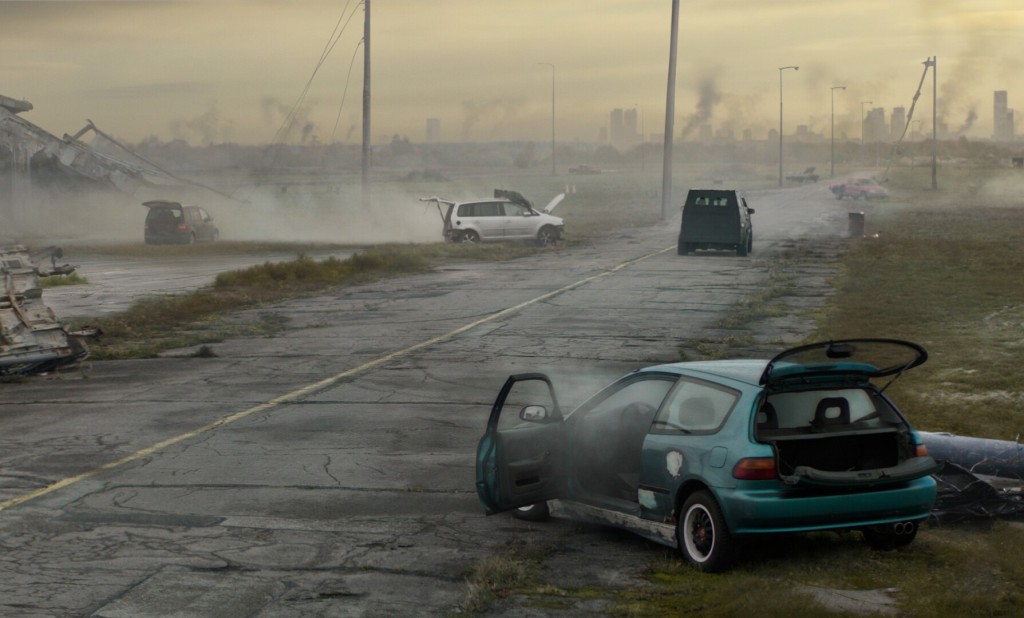
After Us, The Flood's climate dystopic future that mush be averted.
What we got started off very promising, but when our heroes went back in time the film changed gear. This was on one level about what can go wrong with something exotic as time travel when trying it out for real in a major way for the first time. And from this – despite serious consequences – there are dark comedic moments. On another level it is about human misrepresentation, exploitation, trust and faith, not to mention coercive control. In short, this was a very different film to that which I initially imagined. But, as the picture progressed, I warmed to it as an offering about identity, accountability and the straggle to change. This was a very human film and, for all that, I grew to like it. After all, if we are to solve the climate crisis, it is us humans that are going to have to do it: no-one else can!
So, why do I tell you all this about my personal, initial illusions as to what this film was about? Well, it is due to the unique contribution that film fests that focus on recent and more obscure works provide. With a normal general release film, you'll see the trailer on TV or YouTube, a friend may have already seen it, there will be reviews in newspapers, magazines and online… In short, you will know a surprising amount about such films before you sit down to see it. With film festivals there is none of that. You might see an online trailer and whatever the film fest tells you but, in the main, that is it: you yorself come to such offerings fresh and so it is important not to pre-judge… Here endeth a tip on how to get the best out of film fests.
An intriguing take on time travel, I would have loved to have met Finnish director Arto Tapio Halonen, and there was a question & answer session with him after the screening but by then it was 10.30pm and those commuting in had to leave if they were to get home.
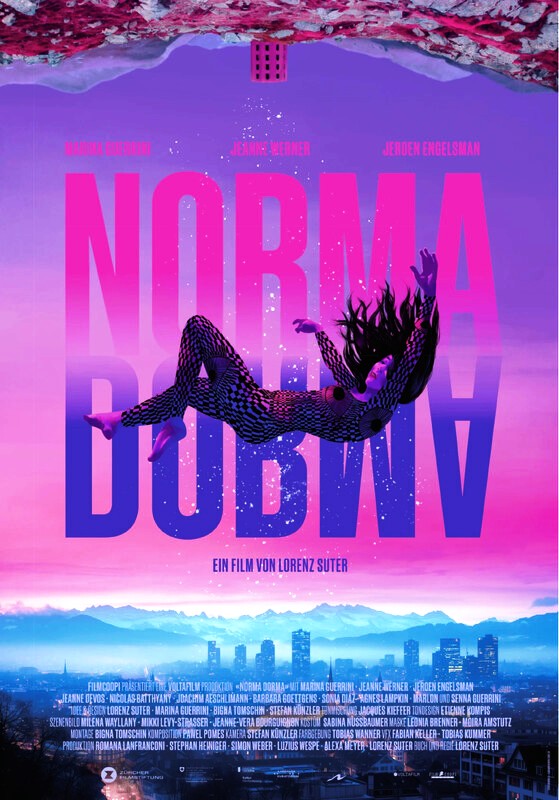
Norma Dorma was a Swiss offering (with a German accent and subtitled) and another UK premiere. Norma’s life has stalled since her partner Henri mysteriously vanished. Stuck in a dead-end job and raising their child alone, her only escape is sleep, where Henri still visits her in vivid, lucid dreams. But when she wakes one morning inexplicably pregnant, those dreams begin to bleed into waking life. As reality twists and time unravels, Norma talks to a new employee at her firm, Mikka, a person linked to Henri and his sleep experiments, who has some secrets of her own. Together, they explore the fragile boundary between the subconscious and the real, chasing answers buried deep in the mind. A quietly surreal, hypnotic and deeply human story, the film explores grief, longing, and the power of dreams to both heal and haunt. Dreams can be a refuge. But what if they become the only place that feels real?
I gave this one a miss as I don't do explorations of grief and longing, let alone dreams to heal and haunt. Apparently, from conversations with others at the fest, I am not alone. However, I have every confidence that this found its audience as the Sci-Fi London programme is well curated and nobody is (or few are) into absolutely everything: science fiction is a broad church.
This dreamy offering might leave one or two viewers wondering exactly what this was all about, but fortunately director Lorenz Suter was there for a post screening interview and question & answer session.
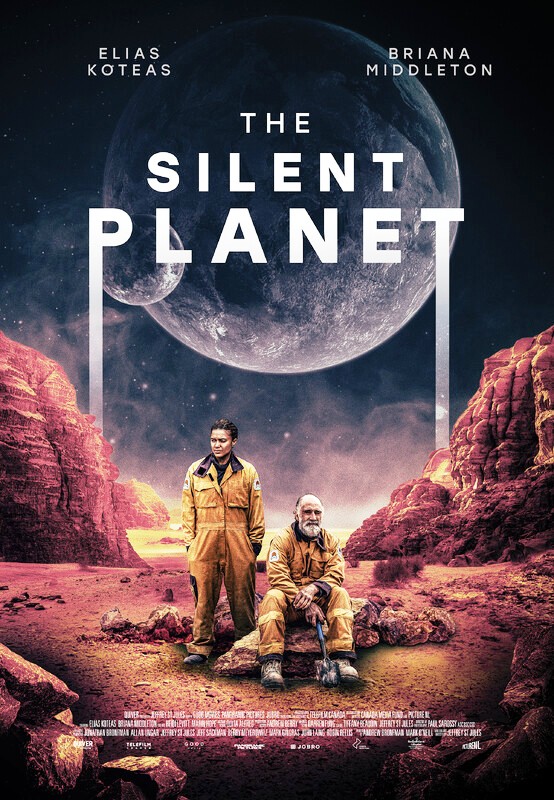
The Silent Planet had nothing to do with C. S. Lewis (it is not that Silent Planet). Now, any self-respecting SF film fest has to have a feature film with a spacesuit: have spacesuit will travel! No, only joshing, but it is always good at film fest's to see in the mix a good old, standard SF trope and for this year The Silent Planet was one such. It was also another UK premiere.
This Canadian film is set in the distant future when serious crime convicts are exiled to a life of solitude on an alien world. Theadore is serving a lengthy sentence for murder he says he did not commit. Then one day another prison pod lands and – something that is not meant to happen – he is no longer alone. The newcomer, Niyya, a convicted terrorist also thinks she is going to a deserted planet and is surprised to find the planet's previous inmate still there.
As their uneasy coexistence unfolds, paranoia and mistrust grow, blurring the lines between reality and delusion.
This is more cerebral SF that explores identity, memory and isolation. What connects us and what do we seek to leave behind?
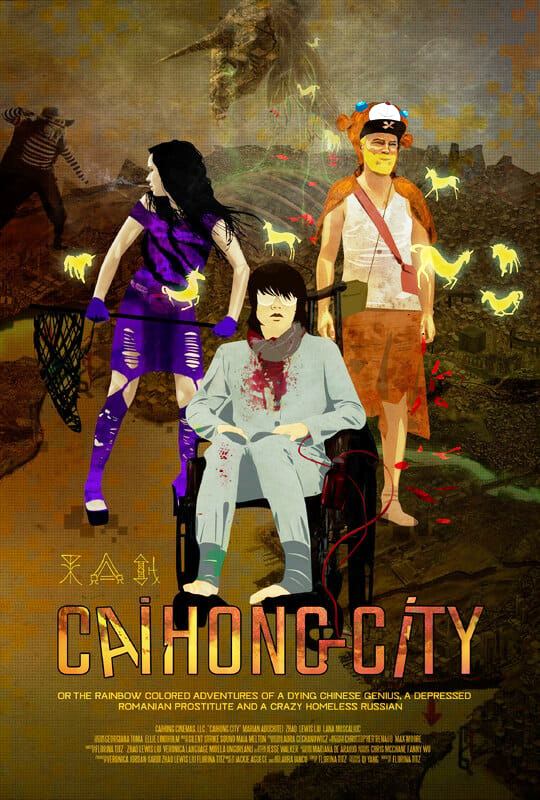
Caihong City is set in the slums of Caihong City, a fractured metropolis. There, a dying Chinese genius named Liu Junjie races to complete a Supertask – an impossibly complex challenge that could earn him passage into the neighbouring utopia, Furui City. But as he builds ‘the map’ (a perfect virtual replica of Caihong), a strange glitch appears, and with it, everything begins to unravel. Enter Serioja, a cryptic Russian drifter, and Lavinia, a fierce, self-destructive Romanian prostitute. Together, they set out across the rainbow-lit sectors of the city, chasing answers and uncovering a truth darker than any of them imagined… Sci-Fi London bill this as 'a sci-fi fairy tale of filth, loneliness, and corrupted dreams. It’s glitchy. It’s grimy. It’s glorious'.
From the director Florina Titz, this Romanian film was a world premiere for Sci-Fi London. It was made by a cast and crew of people from 30 countires and in a language you have never heard before (and so it is subtitled). Contrary to what you might think of the film's poster (above) this is a live-action film.
Sword of Vengeance is billed by its East European makers as Mad Max meets Highlander and this slice of Serbian cinema is action-packed and LOUD. It was also a 'London premiere' which means that it was probably previously screened at a Fest in another English city (there are some great things in the provinces).
Welcome to the badlands of post-apocalyptic Serbia where everything is brutal, broken and boiling with rage. When a young warrior's familiy is slaughtered you just know that the carnage is not going to end. There is only one thing he can do: pick up a sword, hop on a bike and carve a bloody path across the wasteland. But revenge is not that simple; neither is survival. Along the way he must face deranged warlords, radioactive cults, and visions that may not be real… or may even be worse than reality… As Sci-fi London put it, it is a gloriously unhinged ride through the ruins.
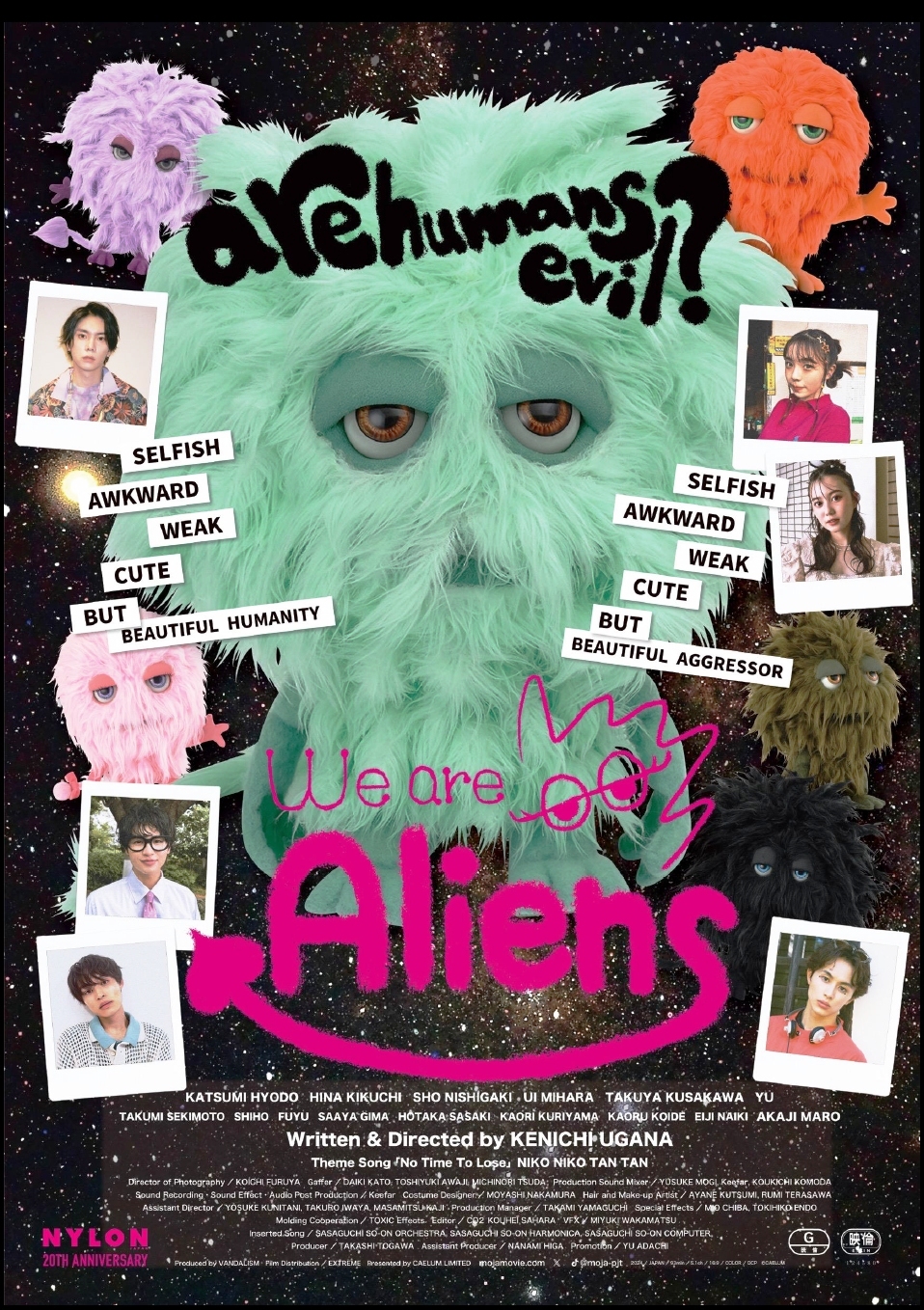
We Are Aliens this was another 'London Premiere' for the Fest. This means that it has been shown at other fests in England, which in turn means that, for those that are fantastic film fest groupies, this is one of those opportunities to see a film again…
This Japanese offering (English subtitles) brings together the beauty of what passes for Japanese camp with cuddly, furry aliens set against a dark premise, they are here from space to exterminate the plague of evil humanity before it reaches the stars.
Yet, there is one flaw in their plan to wipe humanity out: their encountering real-life humans and slowly they begin to realise that humanity may have its plus points after all…
OK, so this is comedy SF but at its heart it does resonate with well-worn SFnal concepts and plots such as those underpinning classics like The Day the Earth Stood Still or It Came From Outer Space. And if you are depressed with current events such as mad autocrats in China, Russian, Israel and N. Korea and the suffering they cause, then We Are Aliens may give you some temporary relief.
The film comes with a nifty music score and a young cast with furry aliens that would not be out of place dangling in your car above the dashboard from the rear-view mirror.
Digby: The Biggest Dog in the World was the golden oldie (the fest usually has one) and this year it was a 1973 British-made comedy. Chaos ensues when a bumbling security guard accidentally feeds a top-secret growth formula to Digby the dog…
Now this screening was both for kids and, for once in a life-time (dogs aren't usually allowed in UK cinemas), pet dogs. The screening also tied in with the Sci-Fido cosplay that followed after.
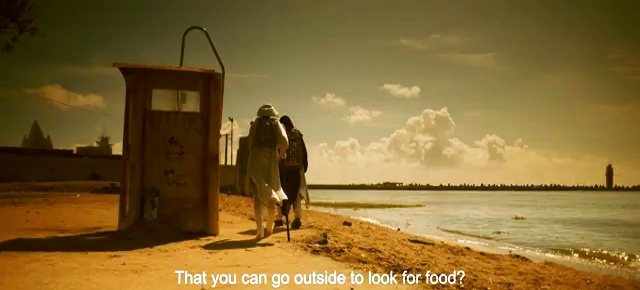
Aire: Just Breathe is a neat, 'quiet Earth' offering from the Dominican Republic in the Caribbean. It is 2147AD and a chemical war and radiation has wasted the Earth, wiped out nearly all of humanity, and made men sterile. In an underground bunker a biologist, Tania, aided by an artificial intelligence (AI) called VIDA, strives to create a baby using artificial gestation. However, on a rare trip to the surface she stumbles upon a mysterious traveller, Azarias. It is not long before tension increases between the three of them… Aire: Just Breathe is visually captivating and explores the complexity of both human and human-AI relationships… The Sci-Fi London screening was its UK premiere.
Following the screening there was a director's Q&A session.
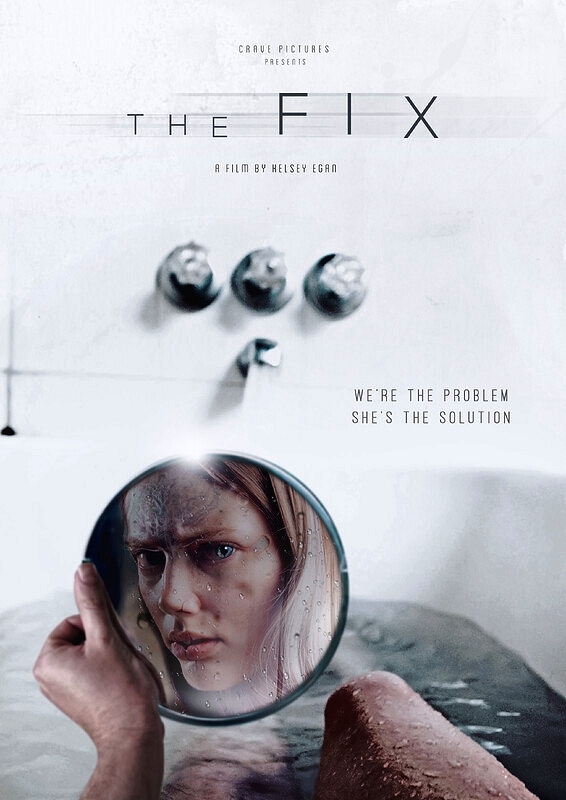
The Fix from South Africa was another UK premiere. It is a gung-ho, decidedly SFnal, action picture, and one I was glad to see on the programme having months earlier happened to catch its trailer on Youtube: I had wondered if it would ever be screened in Britain. Sometime in the future we have messed up the atmosphere with pollutants to such an extent that it is toxic and everyone needs an expensive drug to breathe the air outside of hermetically sealed buildings. This drug – airrem – is, though, expensive and its supply controlled by a powerful biotech company, Aethera. The story concerns an aspiring model who will become the public face and PR image for Aethera. However, when she is exposed to an experimental chemical compound at a party, her body undergoes changes… She soon discovers that there is a dark secret behind Aethera's expensive drug and a cost hidden from society. Suddenly, people are after her… Every drug has its price!
Following the screening there was a director's Q&A session.
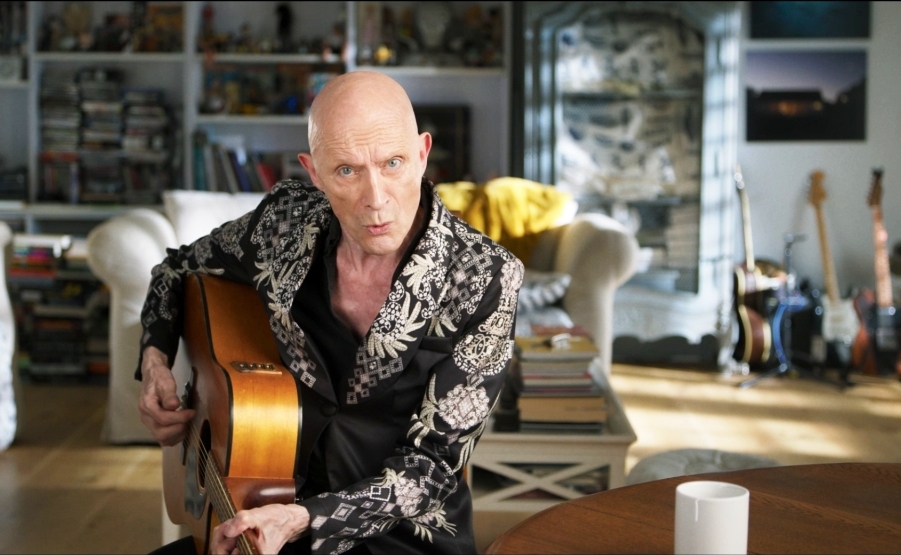
Strange Journey: The Story of Rocky Horror was the fest's non-fiction SF feature, made by a US company but whose subject was a quintessentially British cult production, The Rocky Horror Show with much provided by the one-and-only Richard O'Brien. Many of you love it, and so do I. Indeed, SF² Concatenation has a link with the show in that back in the 1980s one of our founding co-editors, Tony Chester and two of his friends ran one of the first Rocky Horror conventions, and I was there for moral support. (During it, I spent a pleasant hour in the bar while a screening was going on, and had a chat with one of the bar's few other occupants, a lovely lady, when after half an hour I asked her what brought her to the convention? "Oh, I played Magenta…!") Anyway, a documentary on Rocky, what's not to like.
Short films are for me a particular draw. There were six sessions of shorts, each with between seven and nine offerings. The beauty of them is that even if there is one that is not to your taste, you know that there will be another along in a moment. The other thing about shorts is that you often get a neat SF concept, or a different treatment of a common SF trope, presented, and here you get the bare bones without all that hour-long, middle act of most feature films. Indeed, some of the shorts had so much concept in them that they might provide the basis for a full-length feature…
This year, the themes for the shorts sessions were:
– Student showcase
– The Best way to Optimise Your Life
– Error 404: Love Not Found
– Memory Leak
– Somewhere Out There
– Authorised Realities Only
Every year the fest selects which short they consider the best. This year the accolade went to a delightful 11-minute short from the USA called 'Shepherd Moon' that was screened in the Error 404: Love Not Found session. It concerned a power struggle between an alien and her human test subject. Both parties see their relationship differently…
Anyway, that was Sci-Fi London's choice. I myself got to see three of the six sessions of shorts and my own favourite was another USA offering called 'Deep Heist'. Its director, Glen Vivaris, packed a lot into its 10 minutes. It was one of those shorts that could serve the basis for a full-blown feature.
This short opens with four people in a car who put on electronic, glowing collars that transform their facial features into those of US Presidents – with Trump, Obama, Bush in the mix – who, then disguised, break into an office. There they tell the staff that they are not robbing them or their office but are after something previously left behind. Quickly planting a circle of explosives on the floor, they break into the next level down to discover an 'old'(?) artificial intelligence (AI). The four-man team fear that a powerful AI is seeking world domination. However (spoiler alert), the AI is actually recruiting them to take out another AI that is a warped version of itself having had its blueprints stolen by another state. The AI has selected these four as they are most dedicated in their desire to wipe out AI… Brilliant stuff.
Finally, there was one additional session of shorts I always try to catch at Sci-Fi London and that it the finalist screenings to the '48-Hour Challenge'. This is an annual competition that Sci-Fi London runs (as, it has to be said, a few other festivals of fantastic films also run such competitions). The filming bit is done earlier in the year with leading lights of Sci-Fi London deciding on a short-list of ten. Then an invited judging panel (which this year included the author Adrian Tchaikovsky) decide on the winner.
What happens when folk enter the competition is this. At 11am (UK time) on challenge day 1, Sci-Fi London provides entrants with the title of the film they will make, a prop list of one or two items that must be included in the film as well as a line of dialogue and an optional idea/theme. Entrants then have 48 hours to write, shoot and deliver their complete 5-minute film.
While these offerings do not have the polish of more leisurely and professionally produced films, many are surprisingly good and inventive. This year's shortlists included a few riffing on the artificial intelligence (AI) theme, but then given the real-life explosion in AI the past two years, this is perhaps unsurprising.
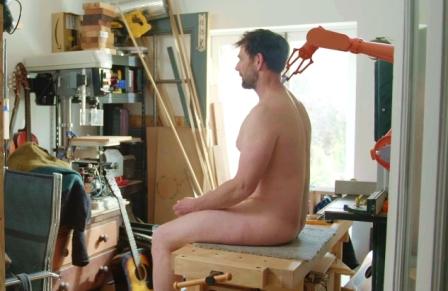
'Warm Welcome' – The 2025 48-Hour Challenge winner!
This year's winner was 'Warm Welcome' by team Death by Cat Bag that itself was a take on AI when someone – in an attempt to get a perfect coffee maker – creates an AI version of himself that goes on to create a multinational company staffed entirely by his replicas that, with a few other, similar multinationals, control the world, marginalising normal human beings… This was a deserving winner.
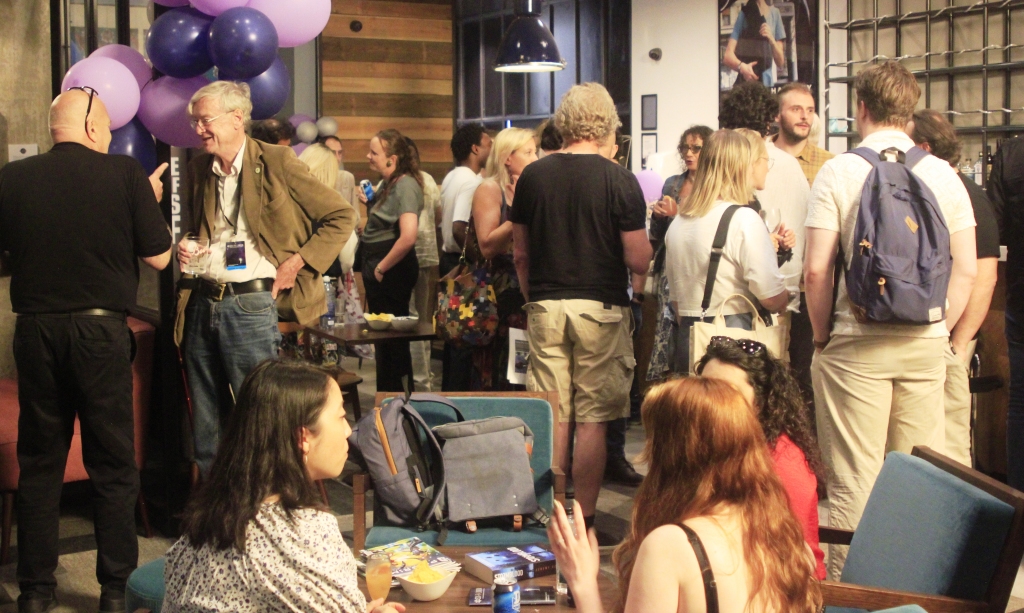
The opening Sci-Fi London reception.
The fest's director, Louis Savy, is far left in black talking to some non-scrot.
Additional extras are a feature of the Fest. As always there is a start-of-fest reception for Sci-Fi London contributors, sponsors, stakeholders with a sprinkling of folk from SE England's science fiction community. You never know who you are going to bump into at these dos. My own first encounter was with an actor who is a semi-regular on the current TV series Foundation that itself is based on the Isaac Asimov series of Foundation books. The very next person I met was the European Space Agency's Head of Lunar Exploration. (It is always good when there is a bit of science about the place.)
The fest's first screening, Matter of Time, took place following the reception.
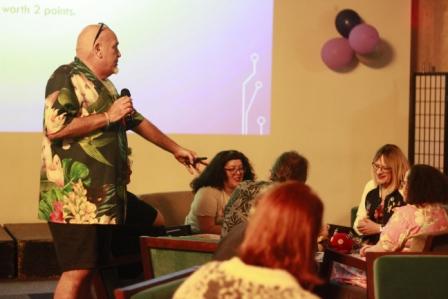
Director, Louis Savy, poses the questions at SFL's annual SF quiz.
The Sci-Fi London pub quiz is one of the free extras and a great bit of fun. Teams of four or five compete and it is always best to have individual expertise on SF books, television and, of course film on hand.
Another free extra was the Sci-Fido cos play for dogs. Again, this free bonus was tied in with the screening of Digby. It has to be said that this year there was an underwhelming lack of contestants, though it was – together with the aforementioned, dog-allowed Digby screening – a neat idea. Sometimes things just don't work, but previous years have seem some success with non-screening extras, such as with a march of zombies.
An additional extra was a karaoke session.
Tips for enjoying Sci-Fi London. There are a few tips for those going to this film fest for the first time, and there will be at least one more fest as the announcement for next years 48-hour challenge has already been made. The first is that Sci-Fi London has become one of those ventures that is now largely cashless so you will need to bring a debit or credit card. Some may feel that this is not something worth mentioning given that cashless options are plentyful. But while that is true, there are very few places where it is completely cashless. Others will know only too well that much of the outskirts of London and many rural areas beyond that cash is still king and those coming from there can get a rude shock when they discover that the King's coin is not sovereign. (There is an SFnal riff here as folk in Esher, a wealthy part of London found out a couple of years ago when rats ate through an internet junction which meant that the cashless high street had to close for five days! There is also a diversity issue in that it is estimated that currently there are 3.1 million in the UK that are cash reliant… I keep telling folk that the machines are taking over but no-one ever listens…)
The second thing to check out is the various multi-session discounts. You pay for each screening session – a single feature film or a session of several shorts – and this year (2025) this single-session cost was £16 (US$20) which is about what you would pay at a standard central London cinema. However, there were discounts if you registered for three sessions of shorts or three features (£34). I myself got an 'all access' pass for £100 (it was advertised as £120 but they reduced it on the day). However, you need to specify in advance which films you want to see as in addition to a lanyard pass you get tickets for each film. Now, there is a good reason for this: they do not want film-makers and their friends purchasing a multi-session pass and then not attending a screening as this leaves seats empty and could deprive someone else from seeing a film (there are fire safety limits to numbers I each theatre). The good news is that you did not have to make all your choices when you buy the pass as they tick these off on a spreadsheet and so you can go back to them halfway through the fest and make additional choices. I mention this as I met a few folk with a 12-session pass who complained that they'd be happy to pay a little more and let their lanyard pass get them access rather than flaff around with tickets for each screening. Yes, fumbling through various tickets to find the right one before each screening was a bit of a pain and so I thought it worthwhile explaining to you why the system is the way it is. Personally speaking, I felt the £100 multi-session, or 'all access' pass was well worthwhile: you spend £75 to £120 (depending when you join) on a four-day Eastercon and Sci-Fi London is a four and a bit days and so really is good value. (Besides, I don't mind if I don't use all the sessions bought: I am happy for the Fest to have a little extra as it's a good cause.)
The third thing is to keep an eye of the Sci-Fi-London website and Facebook #SCIFILONDON as to when and where the next fest will take place. Yes, most residential conventions such as Novacon, announce their dates a year in advance, and Eastercons and Worldcons two years in advance, which enables folk to book annual leave, plan their diary well in advance. Since CoVID Sci-Fi London has not been able to announce their event well in advance. Hopefully this will change for 2026, but in case not, keep an eye on their internet presence. They do have a free e-mail newsletter subscription service, if that helps.
The final thing is to consider staying in a hotel. Finsbury Park (and Stratford used in previous years) has hotels nearby. I think this is a major suggestion. I recall back in the 2000s when the Fest was located in central London that there seemed to be a higher attendance. This could be because commuting to and from central London to all the surrounds is dead easy: London's transport system is largely designed with that in mind. Having the Fest away from central London means that most folk (other than those who live in that part of London) have to travel into the city and then across and out of it again. This makes commuting significantly harder and late night screenings not so easy to attend if one is to make the last trains back or beat the post-23.00 weekend drunken rush. (And this year with the heatwave; being outside, especially in the mornings getting to the Fest, was to be avoided.)
Potential. Is it possible to make a great event even better? Well, quite possibly, and even quite easily. As said, the global CoVID pandemic combined with the changing cinema scene in Britain hence repeated change of location and even personal circumstances of those involved with the fest, has meant less time attracting and a little more difficulty in folk attending the event.
First up, a cursory look around during most of the fest suggest that the screenings saw a quarter of empty seats which means that there is room for up to a third more folk attending. So there is scope for a little increase in numbers. Here, an earlier notice as to when and where the event will take place really would help: it is harder to get folk to commit at short notice.
One thing that would help would be to have some sort of loose link with a nearby hotel. Hotels are used to setting rates for conventions nine or ten months in advance and a small discount rate plus the promise of a late night bar would be a boon. Indeed it transpired, having had lunchtime natters with folk outside, that a good number of fest goers were staying in the same hotel but they only cottoned on to who was a couple of days into the three-day (four night?) event.
The general feeling from those staying in a hotel was that there was nothing to do late in the evenings. Suddenly, I was repeatedly told, after the first night's late film there was nothing. The general consensus was that a scheduled late-night meet up for a night cap at a hotel just for those staying nearby would be a neat idea. Surely a hotel would be happy to guarantee a staffed late bar for the Fest in return for advertising online and adding a residents reception to the Sci-Fi London schedule?
Support. Without being a naysayer, it is likely true to say that there are far fewer Sci-Fi Londons ahead of us than the score or so behind us. Much of the organising team has remained the same, and its director, Louis, was also its founder and so there throughout its incarnation. As noted, next year will be Sci-Fi London's quarter century anniversary. Will it be the last? Well, we just don't know; let's hope not. But almost for sure it will be one of the last. So what can you do to support Sci-Fi London other than attending and, preferably you may think, without costing anything?
Well, you can keep an eye on what they are doing. You can subscribe to their newsletter. You can watch their film trailers on their website and on their YouTube channel. This last is more of a help to them than you might think. If a film maker knows that by allowing a film to be screened at the fest that their trailer will get so many thousands of views, then they are more likely to contribute and gain whatever additional direct benefit there is from having a fest screening.
Finally, you can share their social media on Instagram and Facebook and like these and their YouTube vids. (You might even share and like Sci-Fi London reviews, possibly even this one?) It all helps.
Meanwhile, 2026 beckons. Hopefully this quarter-of-a-century marker will be a sizzler.
Jonathan Cowie
[Up: Convention Reviews Index | Home Page: Science Fact & Science Fiction Concatenation]
[Article Index | Recent Site Additions | Most recent Seasonal Science Fiction News]
